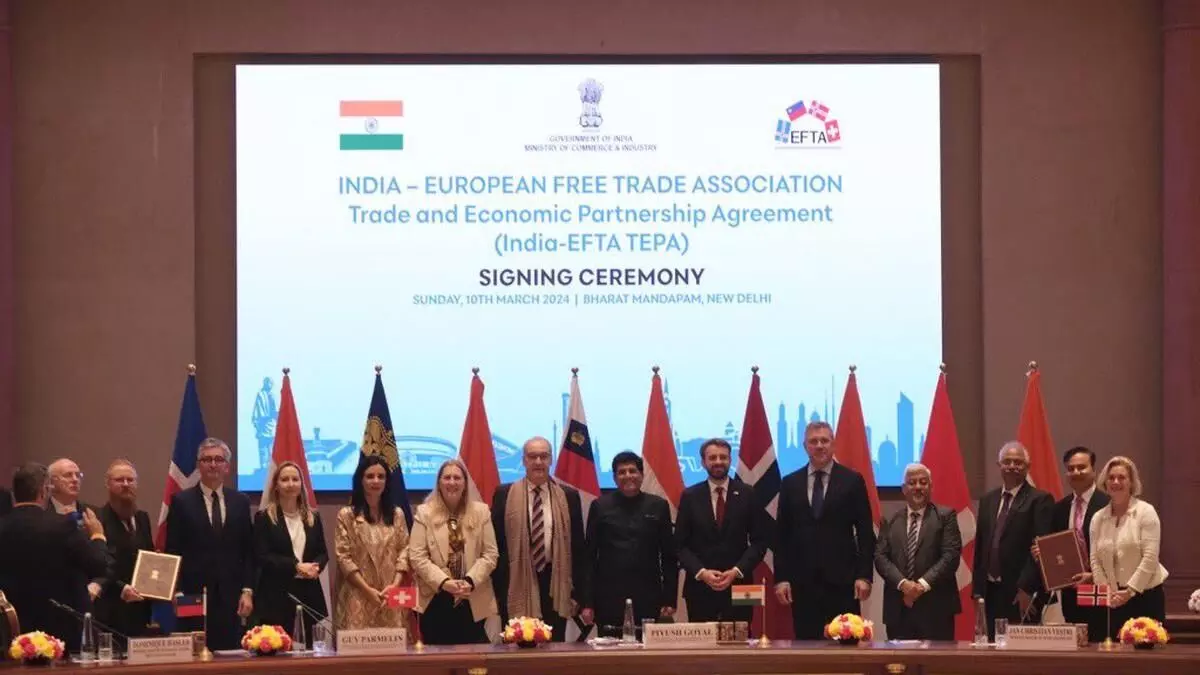European Free Trade Assoc pledges $100 bn investment in India over 15 years
India-EFTA two-way trade stood at $18.65 bn in 2022-23, down from $27.23 bn in the previous fiscal year, with a trade deficit of $14.8 bn
image for illustrative purpose

New Delhi: Prime Minister Narendra Modi on Sunday described the signing of the trade agreement between India and the four-nation European bloc EFTA as a significant moment, emphasizing its representation of a shared commitment to open, fair, and equitable trade. The European Free Trade Association (EFTA) consists of Iceland, Liechtenstein, Norway, and Switzerland. PM Modi expressed India's readiness to support these countries, facilitating industries and businesses not only to meet committed targets but also to exceed them.
The agreement includes a commitment from the EFTA bloc to invest USD 100 billion in India over the next 15 years. "The Tenth of March 2024 marks a new turn and a significant moment in the bilateral relationship between India and EFTA countries," Modi stated. Highlighting the global leadership of the four nations in various sectors such as digital trade, banking, transportation, biotechnology, pharma, and clean energy, he emphasized the potential for collaboration.
"In the last 10 years, India's economy has taken a significant leap, moving from the world's eleventh largest to the fifth largest. Our next goal is to elevate India's economy on the global stage," the Prime Minister remarked. Describing the trade deal as "well-balanced," he noted its reflection of the developmental aspirations of both sides. "TEPA emphasizes our steadfast commitment to shared prosperity and our drive to cultivate a stronger, more inclusive partnership," he added.
Acknowledging the structural diversities between the economies, PM Modi highlighted their complementarities, promising a win-win situation for all nations. "With vast trading and investment opportunities opening up, we have reached a new level of trust and ambition...The trade agreement symbolizes our shared commitment to open, fair, equitable trade, and fostering growth and employment for the youth," he said.
India-EFTA two-way trade stood at $18.65 billion in 2022-23, down from $27.23 billion in the previous fiscal year, with a trade deficit of $14.8 billion. Among the EFTA countries, Switzerland remains India's largest trading partner, followed by Norway.
The highlights of the agreement are:
- EFTA has committed to promoting investments to increase the stock of foreign direct investments by USD 100 billion in India in the next 15 years, and to facilitate the generation of 1 million direct employment in India, through such investments. The investments do not cover foreign portfolio investment.
- For the first ever time in the history of FTAs, a legal commitment is being made to promoting target-oriented investment and the creation of jobs.
- EFTA is offering 92.2% of its tariff lines which covers 99.6% of India’s exports. The EFTA’s market access offer covers 100% of non-agri products and tariff concession on Processed Agricultural Products (PAP).
- India is offering 82.7% of its tariff lines which covers 95.3% of EFTA exports of which more than 80% of imports is Gold. The effective duty of Gold remains untouched. Sensitivity related to PLI in sectors such as pharma, medical devices & processed food, etc. has been taken while extending offers. Sectors such as dairy, soya, coal, and sensitive agricultural products are kept on the exclusion list.
- India has offered 105 sub-sectors to the EFTA and secured commitments in 128 sub-sectors from Switzerland, 114 from Norway, 107 from Liechtenstein, and 110 from Iceland.
- TEPA would stimulate our services exports in sectors of our key strength/interest such as IT services, business services, personal, cultural, sporting, and recreational services, other education services, audio-visual services, etc.
- Services offered by EFTA include better access through digital delivery of Services (Mode 1), commercial presence (Mode 3), and improved commitments and certainty for entry and temporary stay of key personnel (Mode 4).
- TEPA has provisions for Mutual Recognition Agreements in Professional Services like nursing, chartered accountants, architects, etc.
- Commitments related to Intellectual Property Rights in TEPA are at the TRIPS level. The IPR chapter with Switzerland, which has high standards for IPR, shows our robust IPR regime. India’s interests in generic medicines and concerns related to the evergreening of patents have been fully addressed.
- India signals its commitment to Sustainable development, inclusive growth, social development, and environmental protection
- Fosters transparency, efficiency, simplification, harmonization and consistency of trade procedures
- TEPA will empower our exporters' access to specialized inputs and create a conducive trade and investment environment. This would boost exports of Indian-made goods as well as provide opportunities for the services sector to access more markets.
- TEPA provides an opportunity to integrate into EU markets. Over 40% of Switzerland’s global services exports are to the EU. Indian companies can look to Switzerland as a base for extending their market reach to the EU.
- TEPA will give impetus to “Make in India” and Atmanirbhar Bharat by encouraging domestic manufacturing in sectors such as Infrastructure and Connectivity, Manufacturing, Machinery, Pharmaceuticals, Chemicals, Food Processing, Transport and Logistics, Banking and Financial Services, and Insurance.
- TEPA would accelerate the creation of a large number of direct jobs for India’s young aspirational workforce in the next 15 years in India, including better facilities for vocational and technical training. TEPA also facilitates technology collaboration and access to world-leading technologies in precision engineering, health sciences, renewable energy, Innovation, and R&D.

